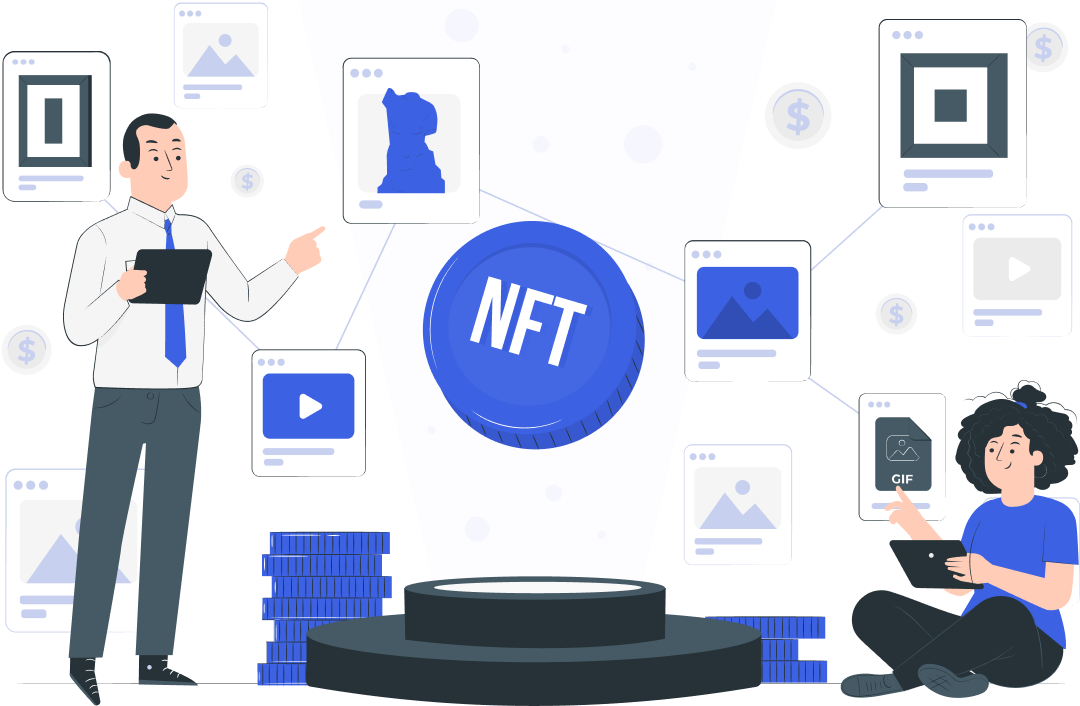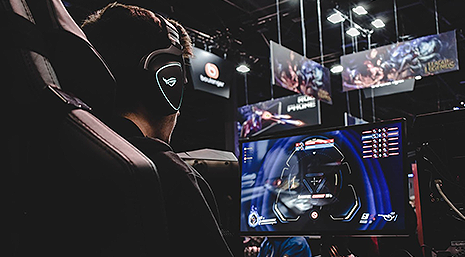GameFi
Join the rapidly growing GameFi sector and partner with ICODA to promote your business and token.
Now applying.Updated: 9月 11, 2025
Published: 10月 29, 2021
Join the rapidly growing GameFi sector and partner with ICODA to promote your business and token.
Now applying.
Imagine a future where people can truly earn money through electronic games. Not just in-game currency, but real cash that can be used to buy food, clothes, and pay bills. Envision a world where all in-game assets like virtual land, clothing, and weapons can be bought and sold in the real world.
This is the core concept behind the development of GameFi, and many active players in the gaming industry believe that this future is not too far off. Of course, GameFi has not fully entered the mainstream yet, which means many people are still unfamiliar with what it is and how it works.
If you share this vision, then please continue reading this article to get all the information about GameFi.

GameFi is the combination of gaming and decentralized finance (DeFi). It is based on the fusion of blockchain technology, the gaming industry, and various DeFi products.
GameFi offers multiple ways for users to earn rewards. Examples include completing tasks, battling other users, or building income-generating structures on their virtual land. Some games even allow users to create income streams without actively participating in the game. In other words, they can stake in-game tokens or earn money by renting them out to other users.
Rewards in GameFi can take various forms depending on the game. They can be in-game items like land or virtual characters, or they can be converted into NFTs (Non-Fungible Tokens) and traded on NFT markets. In-game assets typically provide various benefits to players, such as the ability to earn additional rewards.
The inspiration for GameFi comes from CryptoKitties, a blockchain game platform built on the Ethereum (ETH) network when the concept of NFTs was still relatively unknown.
Subsequently, the NFT industry gained prominence, and during its peak, CryptoKitties had over 15,000 daily users. Unfortunately, the popularity of these NFTs congested the Ethereum blockchain, leading to high transaction fees and long confirmation times.
Developers recognized the need for better blockchain technology to enable faster transactions, scalability, and lower costs. Projects like Polkadot, Solana, and Cardano were some promising ideas.
Then, decentralized finance (DeFi) platforms emerged. The growth of DeFi platforms increased the appeal of GameFi because the new gaming finance systems are entirely based on smart contracts.
This provides players with means to start, sell, lease, or gamble their in-game tokens. This was just the beginning of the "play-to-earn" model.
In addition to gaming rewards, some GameFi projects incorporate elements of decentralized finance (DeFi). Liquidity mining and staking are two major examples that allow users to earn additional income.
For example, staking allows players to use their in-game tokens to earn rewards, obtain unique items, and unlock new game features.
Incorporating DeFi elements also changes the structure of the game, as players holding governance tokens can vote on the game’s future direction, creating a more decentralized game managed by the community rather than large corporations.
Now, let’s delve into the popular GameFi phenomenon known as "Play-to-Earn" (P2E) games.
P2E (Play-to-Earn) is a new way of playing video games and is at the core of all GameFi products. It’s a significant departure from how most games typically operate, where players often have to pay to enjoy the game.
In P2E games, new players usually need to deposit a small amount of funds to get started. Currently, blockchain game developers have to purchase licenses or renew memberships to create video games.
Most traditional online games do not pay participants but rather manage their assets for them. In the P2E paradigm, players have full ownership of their in-game assets as these assets exist in the form of NFTs (Non-Fungible Tokens).
P2E games provide players with complete control, income, and earning opportunities.
Playing GameFi Games
Specific guidelines for each blockchain game may vary, but most games are typically conducted through a web browser. Therefore, to participate in the game, you need to log in using the crypto wallet you set up earlier. To do this, visit the game’s website and find the option to connect your wallet.
This will also serve as your means of logging into the game. Unlike traditional online games, which require you to set up a username and password or provide your email address, blockchain games use your crypto wallet as your account. When connecting your wallet, make sure you are connecting to a legitimate website and not a fake one.
Loading Your Wallet
For those games that do not allow users to earn initial units of cryptocurrency through gameplay, players must load their wallets to actively participate in the game.
The specific cryptocurrency required will be determined by the game and may take some time to obtain the exact cryptocurrency you need.
For example, to start playing the P2E game "Gods Unchained," you first need to load your wallet with the in-game currency, $GODS.
While loading your wallet typically isn’t too difficult, it’s important to understand that this process can have some complexity.
Understanding Requirements
Most blockchain games require players to purchase cryptocurrency tokens or in-game currency. Each game’s requirements are different, but you must first weigh the income potential against the overall risk.
Next, figure out how long it will take to recoup your initial investment and start collecting rewards. In Axie Infinity, for example, you need to have three Axies in your wallet to start battling. These can be purchased from the in-game marketplace.
Advantages of GameFi and Its Impact on the Gaming Industry
Now that we’ve learned what GameFi is, let’s take a look at its advantages. Some of these may be easy to guess, but let’s explicitly state them:
Players Can Earn Money: Players can participate in blockchain games to earn NFTs and make money. Therefore, blockchain-based games may offer new employment opportunities.
Ownership: NFTs within the game can be integrated into decentralized games, increasing their profit potential and providing players with true asset ownership. Game items are not owned by the game developers, as they can be acquired and exchanged on public blockchain ledgers. Additionally, no in-game items can be counterfeited or altered. Players can ensure the security of all their in-game items, even if the development studio encounters technical difficulties.
Player Empowerment: Game designers do not always respect players’ viewpoints. For example, they have been accused of promoting gender-biased ideas and encouraging users to buy more items. In GameFi projects, users can voice their opinions on various aspects of the game’s future, including startup fees.
Player-Friendly Learning Curve: GameFi projects use basic gaming skills, making them easy to learn and operate. This simple approach lowers the entry barrier, leading to widespread adoption.
Comparison to Traditional Video Games
In traditional video games, users can also collect in-game virtual currency and game assets to help their characters level up. However, these currencies and game items cannot be sold outside of the game. In most cases, their utility outside of the game
記事を評価する
プライバシーポリシー
一般的なプライバシーポリシーのテンプレート
This privacy policy ("policy") will help you understand how Global Digital Consulting LLC uses and protects the data you provide to us when you visit and use https://icoda.io ("website", "service").
当社は、本ポリシーを随時変更する権利を留保しており、その際には速やかに最新の情報をお知らせいたします。最新の変更内容をご確認されたい場合は、このページを頻繁にご覧になることをお勧めします。
当社が収集するユーザーデータ
お客様が当ウェブサイトを訪問された際、当社は以下のデータを収集することがあります:
データを収集する理由
当社がお客様のデータを収集するのにはいくつかの理由があります:
データの保護とセキュリティ
Global Digital Consulting LLCはお客様のデータを保護し、機密を保持することを約束します。グローバルデジタルコンサルティングLLCは、最新の技術とソフトウェアを導入することにより、データの盗難、不正アクセス、および開示を防止するために全力を尽くしています。
クッキーポリシー
当社のウェブサイトがクッキーを使用することに同意すると、お客様のオンライン行動に関する収集データ(ウェブトラフィック、お客様が最も時間を費やしたウェブページ、お客様が訪問したウェブサイトの分析)の使用にも同意することになります。
クッキーを使用して収集したデータは、当社のウェブサイトをお客様のニーズに合わせてカスタマイズするために使用されます。統計分析のためにデータを使用した後、データは当社のシステムから完全に削除されます。
クッキーはお客様のコンピュータを制御するものではありません。クッキーは、お客様がどのページが便利で、どのページが便利でないかを監視し、お客様により良いサービスを提供するために使用されます。
個人情報の収集の制限
ある時点で、個人データの使用と収集を制限したいと思うかもしれません。そのためには、以下の方法があります:
グローバル・デジタル・コンサルティング合同会社は、お客様の許可がない限り、お客様の個人情報を第三者に貸与、販売、配布することはありません。法律により強制される場合は、そのようにすることがあります。お客様の個人情報は、お客様が本プライバシーポリシーに同意された場合、販促資料を送付する必要がある場合に使用されます。
ご利用条件
Please read these Terms and Conditions ("Terms", "Terms and Conditions") carefully before using the https://icoda.io website (the "Service") operated by Global Digital Consulting LLC.
本サービスへのアクセスおよび本サービスの利用は、利用者が本規約に同意し、これを遵守することを条件とします。本規約は、本サービスにアクセスまたは利用するすべての訪問者、利用者、その他の者に適用されます。
他のウェブサイトへのリンク
当社のサービスには、Global Digital Consulting LLCが所有または管理していない第三者のウェブサイトまたはサービスへのリンクが含まれている場合があります。
Global Digital Consulting LLCは第三者のウェブサイトまたはサービスのコンテンツ、プライバシーポリシー、または慣行を管理せず、責任を負いません。利用者はさらに、Global Digital Consulting LLCが直接的または間接的に、そのようなWebサイトまたはサービス上で、またはそのようなWebサイトまたはサービスを通じて利用可能なコンテンツ、商品またはサービスの使用または信頼に関連して発生した、または発生したとされる損害または損失について、責任を負わないことを認め、同意します。
変更点
当社は、当社の単独の裁量により、いつでも本規約を修正または置き換える権利を留保します。改訂が重要なものである場合、当社は、新しい規約が発効する前に少なくとも30日前に通知するよう努めます。何をもって重要な変更とするかは、当社の独自の裁量により決定されます。
お問い合わせ
本規約についてご質問がある場合は、当社までご連絡ください。